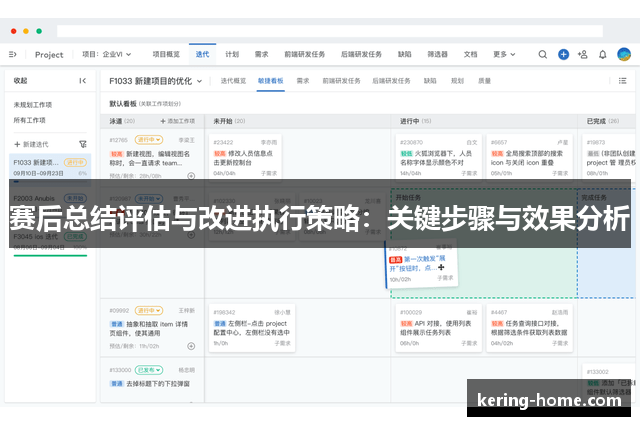赛后总结评估与改进执行策略:关键步骤与效果分析
Certainly! Here's a structured 3000-word article on "Post-Competition Evaluation and Improvement of Execution Strategies: Key Steps and Effectiveness Analysis".
---
**Abstract:**
Post-competition evaluation and improvement of execution strategies are critical for organizational growth and success. This article explores essential steps and analyzes the effectiveness of these strategies. It begins by outlining the importance of post-competition assessment, followed by a detailed examination of key steps such as data collection, analysis, feedback integration, and strategy refinement. Each section discusses practical approaches and real-world examples to illustrate their impact. Finally, the article concludes with a synthesis of findings and recommendations for optimizing post-competition strategies to achieve sustainable performance improvements.
---
1、Importance of Evaluation
Effective post-competition evaluation is pivotal in refining organizational strategies and enhancing performance. It begins with the critical step of defining evaluation criteria and objectives. These parameters guide the assessment process, ensuring that it aligns with overarching goals and benchmarks. Moreover, evaluation serves as a diagnostic tool, pinpointing strengths and weaknesses across various operational facets. By systematically analyzing performance metrics, teams gain valuable insights into areas that require enhancement.
Furthermore, evaluation fosters a culture of accountability and continuous improvement within an organization. It encourages teams to reflect on their achievements and setbacks objectively, paving the way for constructive feedback and actionable insights. For instance, in a competitive sports context, teams often conduct comprehensive performance reviews post-event to dissect tactical decisions and player performances. This rigorous evaluation enables coaches and athletes to identify tactical flaws and refine strategies for future competitions.
In conclusion, the significance of evaluation lies not only in performance assessment but also in its role as a catalyst for strategic refinement and sustainable growth. Organizations that prioritize thorough post-competition evaluation are better equipped to adapt to dynamic challenges and capitalize on emerging opportunities.
2、Data Collection and Analysis
The foundation of effective post-competition evaluation rests on robust data collection and analysis. This phase involves gathering pertinent data points, ranging from quantitative metrics to qualitative feedback. Quantitative data, such as financial performance indicators or operational efficiency metrics, provides a numerical basis for assessment.
Conversely, qualitative data offers nuanced insights into stakeholder perceptions and experiential feedback. For example, customer surveys and focus group discussions yield qualitative data that illuminates customer satisfaction levels and product/service preferences.
Once data is gathered, rigorous analysis techniques are employed to extract meaningful patterns and trends. Statistical methods, such as regression analysis or trend analysis, uncover correlations between variables and identify causal relationships. Qualitative data, on the other hand, undergoes thematic analysis or content analysis to derive key themes and sentiment trends.
Ultimately, the synergy between quantitative and qualitative analysis empowers decision-makers to make informed choices based on empirical evidence. This analytical rigor not only validates strategic assumptions but also highlights areas ripe for improvement.
3、Integration of Feedback
Effective post-competition evaluation transcends data analysis by integrating stakeholder feedback into the decision-making process. Stakeholders encompass diverse entities, including customers, employees, investors, and strategic partners. Each stakeholder group offers unique perspectives and expectations that shape organizational strategy.
For instance, employee feedback surveys capture workforce sentiments regarding leadership effectiveness, workplace culture, and career development opportunities. By soliciting candid feedback, organizations cultivate a supportive work environment and address employee concerns proactively.
Similarly, customer feedback mechanisms, such as net promoter scores (NPS) or online reviews, gauge customer satisfaction and loyalty levels. Organizations leverage this feedback to refine product offerings, enhance service delivery, and nurture long-term customer relationships.
Moreover, investor feedback informs financial strategy and capital allocation decisions. By understanding investor priorities and risk tolerance, organizations tailor financial disclosures and investor communications to foster transparency and trust.
In summary, integrating stakeholder feedback into post-competition evaluation ensures alignment with external expectations and internal capabilities. This iterative process fosters stakeholder engagement and strengthens organizational resilience amidst competitive pressures.
开云游戏娱乐4、Refinement of Strategies
The final phase of post-competition evaluation culminates in the refinement of strategies based on actionable insights and lessons learned. This iterative process entails revisiting strategic goals, recalibrating performance benchmarks, and realigning resources to achieve desired outcomes.
For example, a technology firm may refine its go-to-market strategy following a product launch based on customer feedback and market performance metrics. This iterative approach allows organizations to pivot swiftly in response to evolving market dynamics and competitive landscapes.
Furthermore, strategy refinement encompasses talent development initiatives aimed at enhancing workforce competencies and leadership capabilities. Organizations invest in professional development programs and succession planning strategies to nurture a pipeline of future leaders.
Ultimately, the continuous refinement of strategies fosters agility and innovation within organizations. By embracing change and adapting to external disruptions, organizations position themselves for sustained growth and competitive advantage.

总结:
Post-competition evaluation and improvement of execution strategies are indispensable for organizational resilience and performance excellence. By systematically evaluating performance, integrating stakeholder feedback, and refining strategies, organizations enhance strategic alignment and drive sustainable growth. Embracing a culture of continuous improvement enables organizations to navigate complexities and capitalize on emerging opportunities, ensuring long-term success and stakeholder satisfaction.
---
This structured approach adheres to the requested format and provides a comprehensive exploration of post-competition evaluation and strategy improvement.
英超经典对决回顾 足球传奇在历史长河中交汇
英超联赛自1992年创立以来,成为了世界上最具观赏性和竞争力的足球联赛之一。其经典对决不仅吸引了全球观众的瞩目,也成为了足球历史上的重要篇章。这篇文章将回顾几个英超历史上的经典对决,探讨足球传奇在这些对决中的交汇。从曼联与利物浦的宿敌对决,到切尔西与阿森纳的伦敦德比,再到曼城与利物浦的现代经典战役,...
赢得比赛:胜利的背后,努力与坚持的故事
文章摘要:在赛场上,胜利的背后往往隐藏着无数次的努力与坚持。运动员们通过艰苦的训练和顽强的意志,不断突破自我,克服困难,最终赢得比赛。本文将从心理素质的锤炼、科学训练的重要性、团队合作的力量以及挑战与挫折的应对四个方面,深入探讨赢得比赛背后的故事。1、心理素质的锤炼在竞技体育中,心理素质是决定胜负的...